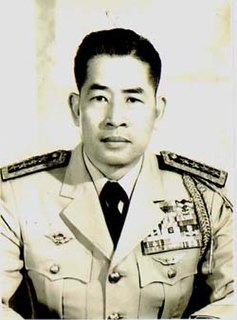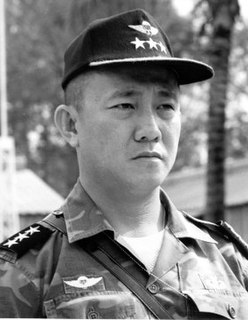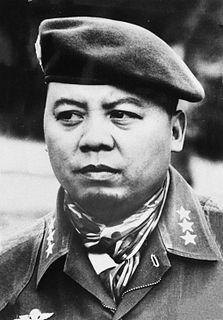 W
WCao Văn Viên was one of only two South Vietnamese four-star army generals in the history of the Army of the Republic of Vietnam during the Vietnam War. He rose to the position of Chairman of the South Vietnamese Joint General Staff. Considered one of "the most gifted" of South Vietnam's military leaders, he was previously called an "absolute key figure" and one of "the most important Vietnamese military leaders" in the U.S.-led fighting during the Vietnam War. Along with Trần Thiện Khiêm he was one of only two four-star generals in the entire history of South Vietnam.
 W
WPrince Norodom Chantaraingsey was a member of the Cambodian royal family and a Cambodian nationalist. Initially a leader of the guerrilla resistance against the colonial French, he went on to become a prominent general in the Khmer National Armed Forces (FANK) during the Cambodian Civil War, as well as a businessman and occasional writer.
 W
WĐèo Văn Long was the White Tai leader of the Autonomous Tai Federation of Northwestern Tonkin in post-war French Indochina.
 W
WLieutenant General Đỗ Cao Trí was a general in the Army of the Republic of Vietnam (ARVN) known for his fighting prowess and flamboyant style. Trí started out in the French Army before transferring to the Vietnamese National Army and the ARVN. Under President Ngô Đình Diệm, Trí was the commander of I Corps where he was noted for harsh crackdowns on Buddhist civil rights demonstrations against the Diệm government. Trí later participated in the November 1963 coup which resulted in the assassination of Diệm on 2 November 1963.
 W
WDương Văn Minh, popularly known as Big Minh, was a South Vietnamese politician and a senior general in the Army of the Republic of Vietnam (ARVN) and a politician during the presidency of Ngô Đình Diệm. In 1963, he became chief of a military junta after leading a coup in which Diệm was assassinated. Minh lasted only three months before being toppled by Nguyễn Khánh, but assumed power again as the fourth and last President of South Vietnam in April 1975, two days before surrendering to North Vietnamese forces. He earned his nickname "Big Minh", because at approximately 1.83 m (6 ft) tall and weighing 90 kg (198 lb), he was much larger than the average Vietnamese.
 W
WBernard B. Fall was a prominent war correspondent, historian, political scientist, and expert on Indochina during the 1950s and 1960s. Born in Austria, he moved with his family to France as a child after Germany's annexation, where he started fighting for the French Resistance at the age of sixteen, and later the French Army during World War II.
 W
WHồ Chí Minh, born Nguyễn Sinh Cung, also known as Nguyễn Tất Thành, Nguyễn Ái Quốc, Bác Hồ, or simply Bác, was a Vietnamese revolutionary and politician. He served as Prime Minister of North Vietnam from 1945 to 1955 and President from 1945 until his death in 1969. Ideologically a Marxist–Leninist, he served as Chairman and First Secretary of the Workers' Party of Vietnam.
 W
WHoàng Văn Thái, born Hoàng Văn Xiêm, was a Vietnamese Army General and a communist political figure. His hometown was Tây An, Tiền Hải District, Thái Bình Province. During the Tết Offensive, he was the highest senior North Vietnamese officer in South Vietnam. He was the first chief of staff of the Vietnam People's Army, and was responsible for key military forces in North Vietnam. He was also Chief of Staff in the Battle of Điện Biên Phủ.
 W
WNguyễn Khánh was a South Vietnamese military officer and Army of the Republic of Vietnam general who served in various capacities as head of state and prime minister of South Vietnam while at the head of a military junta from January 1964 until February 1965. He was involved in or against many coup attempts, failed and successful, from 1960 until his defeat and exile from South Vietnam in 1965. Khánh lived out his later years with his family, in exile in the United States, and died of pneumonia and end-stage kidney failure at a hospital in San Jose, California, on 11 January 2013.
 W
WMarshal Lon Nol was a Cambodian politician and general who served as Prime Minister of Cambodia twice, as well as serving repeatedly as defence minister and provincial governor. As a nationalist and conservative, he led the military coup of 1970 against Prince Norodom Sihanouk, abolished the monarchy, and established the short-lived Khmer Republic. Constitutionally a semi-presidential republic, Cambodia was de facto governed under a military dictatorship. He was the commander-in-chief of the Khmer National Armed Forces during the Cambodian Civil War. After the Khmer Rouge captured Phnom Penh, Lon Nol fled to the United States, first to Hawaii and Michigan and then to California, where he remained until his death in 1985.
 W
WJames B. McGovern Jr. was a World War II fighter pilot and later an aviator with the Central Intelligence Agency. He and co-pilot Wallace Buford were the only Americans to die in combat in the First Indochina War. At the time, they were officially employees of Civil Air Transport.
 W
WPierre Isaac Isidore Mendès France, known as PMF, was a French politician who served as President of the Council of Ministers for eight months from 1954 to 1955. He represented the Radical Party, and his government had the support of the Communist Party. His main priority was ending the war in Indochina, which had already cost 92,000 dead, 114,000 wounded and 28,000 captured on the French side. Public opinion polls showed that, in February 1954, only 7% of the French people wanted to continue the fight to regain Indochina out of the hands of the Communists, led by Ho Chi Minh and his Viet Minh movement. At the Geneva Conference of 1954 he negotiated a deal that gave the Viet Minh control of Vietnam north of the seventeenth parallel, and allowed him to pull out all French forces. The United States then provided large-scale financial, military and economic support to South Vietnam.
 W
WNguyễn Chánh Thi was an officer in the Army of the Republic of Vietnam (ARVN). He is best known for being involved in frequent coups in the 1960s and wielding substantial influence as a key member of various juntas that ruled South Vietnam from 1964 until 1966, when he was overpowered by Republic of Vietnam Air Force chief and Prime Minister Nguyễn Cao Kỳ in a power struggle and exiled to the United States. Known for his flamboyant style and hostility to U.S. advice, Thi's ouster was supported by the American leadership, who backed Kỳ's pro-U.S. regime.
 W
WNguyễn Văn Hinh was the chief of staff of the Vietnamese National Army and the first Vietnamese officer in the French Armed Forces to be promoted to the rank of general. Educated in the French style, he served in the Armée de l'air and Troupes coloniales before accepting a role in the army of the new State of Vietnam within the French Union. Hinh is somewhat of an oddity in the 20th century military history of Vietnam as he attained the rank of lieutenant general in two separate countries, not unlike his North Vietnamese counterpart Nguyễn Sơn who served as a major general in both the People's Army of Vietnam and the People's Liberation Army of China.
 W
WPhạm Văn Đổng was a South Vietnamese general. In 1965, as military governor of Saigon, he had successfully repressed Buddhist mobs instigated by Thích Trí Quang of the Ấn Quang group and Thích Tâm Châu of Việt Nam Quốc Tự. With his commanding skills and knowledge, Đổng was regarded highly by American and French officers, and well respected by many ARVN officers. A staunch nationalist and anti-communist, he was considered an ally to the labor union, the Northern Catholics, several Việt Nam Quốc Dân Đảng factions, multiple Đại Việt groups, Việt Nam Cách Mạng Đồng Minh Hội high-ranking members, Duy Dân and Hòa Hảo leaders.
 W
WAllen Lawrence Pope is a retired US military and paramilitary aviator. He rose to international attention as the subject of a diplomatic dispute between the United States and Indonesia after the B-26 Invader aircraft he was piloting in a Central Intelligence Agency (CIA) covert operation was shot down over Ambon on 18 May 1958 during the "Indonesian crisis".
 W
WTôn Thất Thiện (1924-2014) was a South Vietnamese nationalist of the post-World War II generation who had the rare distinction of serving and watching at close quarters the two historic leaders of post-World War II Vietnam: presidents Ho Chi Minh in the Viet Minh coalition in 1945–46, and Ngô Đình Diệm 1954–55/1956–59/1963. He played a significant though understated role in the nationalist attempt to preserve a non-communist Vietnam.
 W
WTrình Minh Thế was a Vietnamese nationalist and Cao Dai military leader during the end of the First Indochina War and the beginning of the Vietnam War.
 W
WVang Pao was a major general in the Royal Lao Army. He was a leader of the Hmong American community in the United States.
 W
WVõ Nguyên Giáp was a Vietnamese general and communist politician, regarded as one of the greatest military strategists of the 20th century. He served as interior minister in President Hồ Chí Minh's Việt Minh government, the military commander of the Việt Minh, the commander of the People's Army of Vietnam (PAVN), minister of defence, and deputy prime minister. He also served as a member of the Politburo of the Vietnam Workers' Party, which in 1976 became the Communist Party of Vietnam.